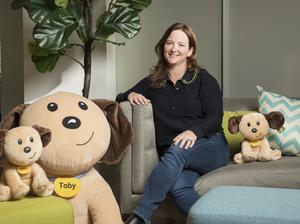
Shadiah Sigala has always wanted to make the world a better place. She studied public policy at Harvard and worked in health care policy for a while, but eventually got tired of being at a corporate job.
So she tried her hand at being a personal chef and caterer. It wasn't enough to live off of but led her to become a founder — first at Honeybook, a platform to help entrepreneurs run their small businesses, and more recently Kinside, a marketplace that helps working parents find child care.
On Tuesday, Kinside announced a $12 million Series A round that was led by Wellington Ventures and also included Magnify Ventures, Initialized Capital and Maven Ventures. This brings the company's total funding to $16 million.
"This funding… was led primarily by mothers, venture capitalists who happen to be mothers. Their lived experience tells them that there's a really huge business to be had," Sigala, Kinside's CEO, told me. "Nobody's normalized it, nobody's digitized it, nobody's won that game" yet.
Sigala, 37, co-founded the San Francisco company in 2018 with CTO Abe Han and CMO Brittney Barrett.
While working at Honeybook, Sigala became the company's first pregnant employee, prompting the team to think about how they wanted to structure employee benefits for parents. In addition to designing leave policies, one of the most important and stressful aspects of becoming a new parent, especially for anyone who gives birth, is figuring out the logistics of returning to work and arranging child care.
Honeybook wanted to offer child care as an employee benefit but as Sigala researched the market, there were very few options and nothing was affordable or tailored for the needs of a small startup.
So she started Kinside to create a benefit program that streamlines the hunt for convenient and affordable child care across the country.
"We are gonna stay an employer-based model," Sigala said, but at some point Kinside could reach so many employers that "it will be hard not to have Kinside, at which point it essentially becomes a de facto consumer product."
The platform operates as a marketplace where employees can browse for discounted rates and priority access at child care providers that partner with Kinside.
Kinside takes a commission from providers when parents enroll and charges employers a subscription fee to provide the platform to their employees. It also contracts directly with other employee benefits platforms, like flexible spending accounts, to provide the service through third-parties.
Their goal is to expand child care as a benefit for working parents in the U.S., which is an outlier among wealthy nations when it comes to subsidizing child care.
The U.S. government averages spending $500 annually per child up to two years old for early child care, lower than most other OECD countries, according to a report from the New York Times in 2021. Israel averages around $3,300 per child and Norway spends nearly $30,000.
There's a broader "trend where employers are becoming primary stakeholders in the child care space in some way or another. In the past, childcare was relegated to being 100% a private issue that your employees — let's face it, mothers — had to deal with quietly and totally on their own," Sigala told me. "The pandemic clearly brought that to a horrific crash. And this otherwise private household issue became a public policy and economic issue."
The company currently has 20 employees distributed across the U.S. and Canada, and Sigala would like to double that figure. She also wants to more than triple the number of employers on the platform from 3,000 to 10,000.








